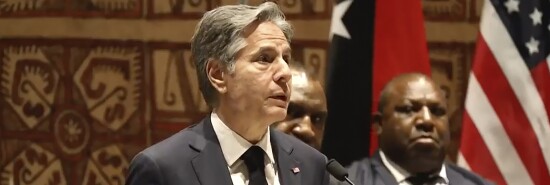
Will US moves in the South Pacific pay off?
Daniel DePetris
Secretary of State Antony Blinken traveled this week to Papua New Guinea, a Pacific island nation of roughly 10 million people, to sign a bundle of security and maritime awareness agreements. At the time of writing, the full scope of those deals is still a mystery. The basic points, though, have long been known: The United States will receive additional access to PNG airfields and ports, the PNG government gets $45 million in U.S. assistance (including military equipment for its maritime forces), and the U.S. Coast Guard will be permitted to patrol the PNG coast alongside the PNG defense force.
The deal is part of a list of accords Washington is in the process of concluding with other island nations in the vast, blue expanse of the Pacific Ocean. U.S. presidential envoy Joseph Yun told Reuters that the Biden administration is finalizing security pacts with Palau and Micronesia as well, an extension of soon-to-be-expired Compact of Free Association agreements that gift the U.S. veto power over the islands’ foreign policy in exchange for a number of incentives from the U.S., such as visa-free travel and defense commitments. A similar accord with the Marshall Islands is scheduled to be signed over the next several weeks.
FEDERAL OFFICIALS HAVE NO RIGHT TO ORDER SCHOOLS TO CARRY INDECENT BOOKS
Powering all of this activity, of course, is concern about China. Beijing spooked Washington when it successfully concluded a defense agreement with the Solomon Islands in April 2022. That arrangement, which also hasn’t been publicized, supposedly allows the People’s Liberation Army Navy to dock in the Solomon Islands’ ports and deploy PLA personnel for the purposes of defending Chinese nationals and Chinese-financed infrastructure projects. China also tried to sign a multilateral defense deal with 10 Pacific island states last year but failed after several of them questioned Beijing’s motivations and were concerned such an accord would place the region in the middle of a superpower clash between the U.S. and China.
The Biden administration treated the China-Solomon Islands pact as a hair-on-fire moment. Even before the ink was dry, the U.S. announced its intention to open an embassy there in what smelled like a panicked, last-minute attempt to dilute whatever security advantages Beijing would accumulate (the embassy was officially open for business in February). This month, the U.S. opened another embassy in Tonga, 1,800 miles to the southeast. If the White House gets its way, the Marshall Islands, Micronesia, and Palau will be the beneficiaries of a combined $7.1 billion in U.S. assistance over the next 20 years — all in the name of countering China’s influence in a region traditionally viewed as the purview of the U.S. and allies in South Pacific, including Australia and New Zealand.
The U.S. is looking at all of these agreements through the prism of its China policy. If these small nations are in America’s corner, the logic goes, then China will be locked out of a critically important strategic region home to international shipping lanes and natural resources. China’s drive in the South Pacific is likely fueled by the same calculus, only in reverse.
The inhabitants of the region, however, don’t seem to want to pick sides or enable the superpowers in their quest to treat the area as a geopolitical playground. Pacific island leaders have gone out of their way to quickly disabuse Washington and Beijing of the notion that any of these agreements allow them to turn their territories into military garrisons.
After the deal with China was agreed to, Solomon Islands Prime Minister Manasseh Sogavare dismissed the notion that deeper defense ties with Beijing would translate into the PLA establishing military bases there. Similarly, Papua New Guinea’s prime minister, James Marape, stressed that his own deal with the U.S. wasn’t a treaty and doesn’t prohibit the country from signing something similar with other countries.
CLICK HERE TO READ MORE FROM THE WASHINGTON EXAMINER
“There’s a specific clause that says that this partnership is not a partnership for PNG to be used as a place for launching offensive military operations from Papua New Guinea,” Marape told local radio on Tuesday.
The South Pacific is a center of diplomatic action this year, drawing in the world’s two biggest economic and military powers as they try to compete for advantage. The question is whether any of these powers have even pondered the risks associated with this flurry of diplomacy. Over time, the U.S. and China could find that the islands simply have a different interpretation of what these arrangements entail. And the islands may eventually find that they unwittingly trapped themselves in the great power game.
Daniel DePetris (@DanDePetris) is a contributor to the Washington Examiner’s Beltway Confidential blog. His opinions are his own.
